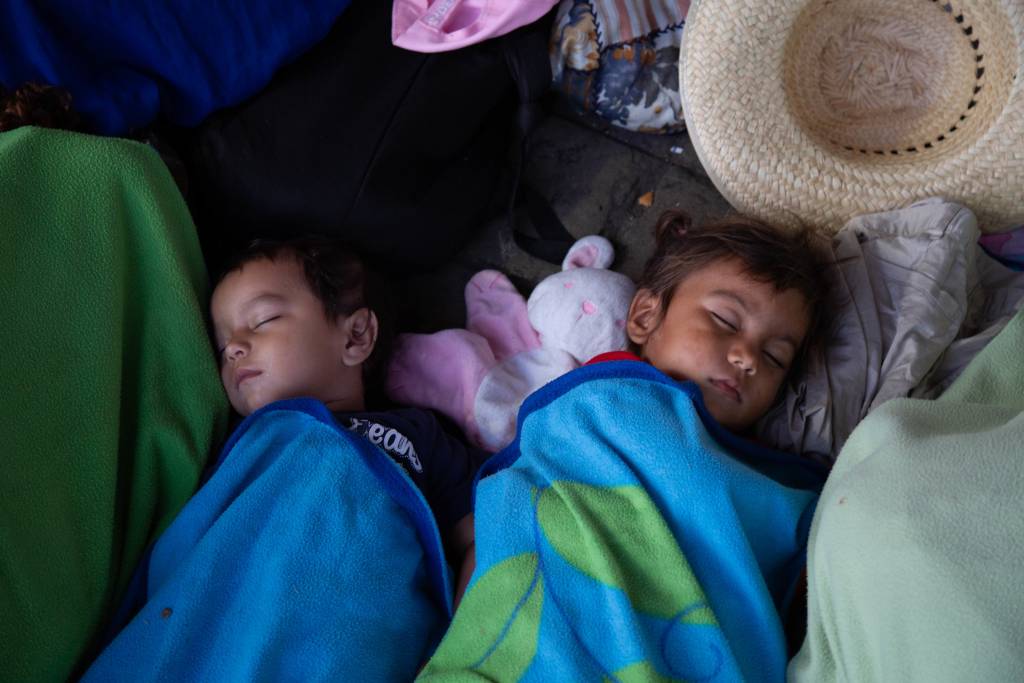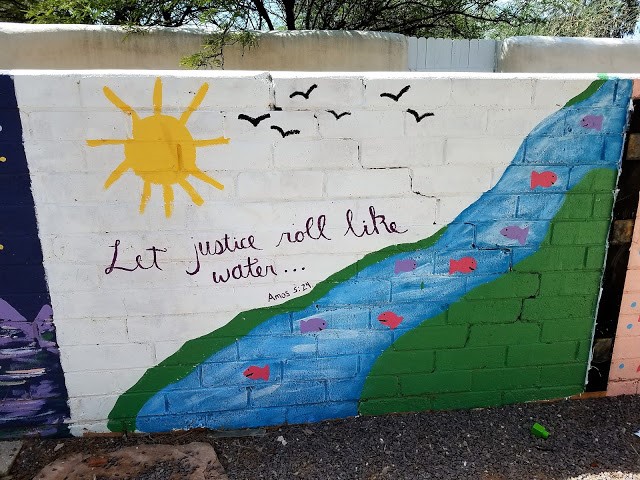
photo by ACT/Sean Hawkey
In the spotlight since its mobilization in early October, the migrant caravan continues to receive media attention as it moves toward the U.S./Mexico border. Estimated numbers of the group hover around 7,000, including families—UNICEF estimates the group contains at least 2,300 children—all seeking asylum within the United States. While the story of the caravan is important and still developing, it is merely another detail in the ongoing, long-term situation at the southern border, where family separations and open-ended detentions are still the norm.
When considering the sizable challenges facing refugee families in need, many individuals and congregations are motivated to organize food and clothing drives, aiming to help those waiting for settlement. However, these well-intentioned gifts may not suit the needs of those for whom they are intended. Storage space in most humanitarian locations is not big enough to hold even several weeks worth of donations. The man-hours required to sort, wash and distribute used clothing are “expensive” when staff and volunteer burnout is high and those hours are needed elsewhere. Nevertheless, interfaith collaboration at the border and beyond is crucial, and the “boots on the ground” organizations we discuss below provide a successful road map as to how to work together to achieve these goals.
Each of these organizations provides asylum seekers with accommodations, meals, hygiene, warm clothing, miscellaneous travel needs, orientation and encouragement. Before being discharged—with only the clothes on their back and their immigration papers—refugees must clear background checks and customs. Transition to a local shelter is usually coordinated beforehand, however, in late October, ICE began releasing people without making any prior arrangements. Faced with this new reality, the faith community has come together yet again to expand transitional housing and put out a call for aid.
Located in El Paso, Texas, Annunciation House (AH) was founded in 1976 as a nonprofit, volunteer organization serving those “who cannot be assisted by existing programs, agencies or offices.” One of several border area missions, Annunciation House has since evolved to serving refugees and is entirely funded by the spontaneous generosity of the public. Presbyterians have long volunteered with Annunciation House and as the need grew, they opened a satellite shelter to expand AH capacity, where they serve roughly 90 asylum seekers per week.
Approximately 770 miles away in McAllen, Texas, the nonprofit Humanitarian Respite Center (HRC) has received up to 500 refugees and immigrants a day. Currently run out of a building rented from the local sheriff, HRC’s capital campaign to fund construction of a 2-story, 15,000 sq. ft. building downtown is in progress, but for now they are often left without beds—in this case mats—for those in their care. Presbyterian volunteers at the facility the last week of September 2018 transported “overflow” refugees to other locations for the night. Volunteers that week also made the acquaintance of a young mother and her daughter who were stuck in a holding pattern as their sponsors were displaced as a result of Hurricane Florence in the Carolinas. They were both in good spirits, however, and while the mother cooked the daughter helped assemble travel snack bags.
Just “up the road” from McAllen in San Antonio, the Interfaith Welcome Coalition (IWC), continues to minister with and provide public witness for mothers and their children who are detained at the family immigration detention centers in Dilley and Karnes, Texas. Similar to the other ministries near the border, they meet families who are released on bond after months of incarceration with only the clothes on their back and their immigration papers. In addition, the IWC is active in advocating for the end of family detention and more humane immigration practices.
The Inn Project in Tucson, Arizona, organized by The United Methodist Church in 2016, provides safe temporary assistance to Central American refugee or asylum-seeking families. As one of the newest transitional shelter programs in Tucson, The Inn helps the asylum seekers make contact with their families in the U.S. and coordinate transportation to join them. In July 2018, the nonprofit assisted 589 individuals, predominantly Central Americans, including two completely intact families (mother, father and children). In October, due to an increase in ICE releases, St. Mark’s Presbyterian Church in Tucson set up rooms in their church as an overflow site. The Inn has created a dedicated Amazon list to ensure that what is donated is something the refugees can use. Please purchase from this list only so that TIP can continue to accurately manage their logistical needs.

photo by Richard Underdahl-Pierce
It is natural to focus on attending to the physical needs of transitioning asylum-seekers because these needs are necessary on a daily basis. However, bearing witness to what is happening during legal processing is equally important. The Texas Interfaith Center for Public Policy/Texas Impact needs people of faith to participate in “Courts & Ports: Faithful Witness on the Texas-Mexico Border.” As a volunteer participant, you will spend two days observing the proceedings in a federal criminal court and sharing your findings with ACLU and other attorneys. Observers are an integral part of the immigration court system, potentially encouraging an asylum seeker to plead not guilty as well as empowering judges to request modifications in the court’s process.
These are just a few interfaith partners dedicated to making a difference for refugees and asylum seekers at the border—some have been doing so for more than 40 years. Despite the overall decrease in numbers coming to the border, the large population being released from detention on a daily basis is staggering. The need for financial and volunteer assistance therefore remains considerable, and the opportunity for individual and congregational involvement is vast.
This is not just a “border situation.” There are immigrants throughout the country, many of them families who have traveled thousands of miles to be with their loved ones. So, how do individuals and churches engage with the immigrants in their local communities? How do we take appropriate steps to make that connection? We will consider these questions more fully in a future blog post. For now, supporting aid organizations focused upon those just entering the U.S. is a good place to start.
Give
To support these and other Presbyterian-connected ministries, donate to US Refugee Emergencies. PDA has already released several grants through the Presbyteries in the region and will continue to do so as funding is available.
You can also donate directly to The Inn or IWC Backpack Ministry.
Volunteer
If you are called to give of your time, there are places that need out-of-town volunteers. PDA can assist you if you have a group of 3 or more volunteers. Information is also available for individual volunteers to make their own arrangements.
McAllen and El Paso
Sacred Heart Respite Center, a volunteer opportunity in McAllen, is listed on the PDA website. Information about a volunteer opportunity in El Paso will be posted there soon.
Ports & Courts: To register yourself or your group please email Texas Impact (registration website coming soon).